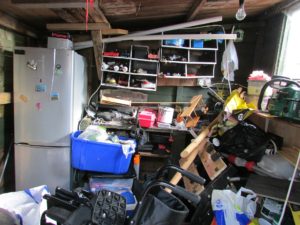 I took a class on clutter coaching. It trains you to coach people through managing their clutter. When I read about the course I thought it would help me help my clients deal with their clutter, a common problem for many people affected by ADHD. I also thought it would be good for me personally because I have a lot of stuff. I was about to move and needed to downsize my stuff.
I took a class on clutter coaching. It trains you to coach people through managing their clutter. When I read about the course I thought it would help me help my clients deal with their clutter, a common problem for many people affected by ADHD. I also thought it would be good for me personally because I have a lot of stuff. I was about to move and needed to downsize my stuff.
When I first read about the course I thought it was about organizing but it is not. It is about one’s relationship with their clutter. Much of what we choose to keep in our homes is about old identities, that is the people we used to be. For example, I had about 200 to 300 dance books because I used to be a dancer, dance teacher and choreographer. I haven’t worked professionally in the dance world for 20 years yet I still have all these books. I also realized I still had two drawers filled with dance clothes from many sizes ago. Why am I holding onto to these things when others could use them?
Popular right now is Marie Kondo’s The KonMari Method. Based on a book she wrote called “The Life-Changing Magic of Tidying Up: The Japanese Art of Decluttering and Organizing.” I will admit I never finished reading her book or the companion book “Spark Joy: An Illustrated Master Class on the Art of Organizing and Tidying Up.” What I have picked up and what is sweeping the organizing world is the idea of holding an object and asking the question, “Does it spark joy?” If it no longer sparks joy then is it necessary to keep?
The instructor of my clutter coaching class narrowed down the reasons we keep things that no longer serve us to seven excuses:
It was a gift
Just in case
I’ll get it fixed
My kids might want it
It’s worth a lot of money
I don’t want to add to landfills
It’s my spouse’s stuff
“Just in case” and “I’ll get it fixed” are two particularly difficult ones for those of us affected by ADHD. It allows us to hold on to things that we will never use again. As I often say to my ADHD clients much of our clutter is decisions not made. Not sure what to do with a document, just add it to the pile of documents already sitting on your desk. It becomes a decision for another day. Unfortunately that decision day often never arrives. Then it becomes clutter. The clutter grows and becomes overwhelming and unapproachable.
This is often when we need outside help. I recently wrote about professional organizers as a great resource to help clear away clutter in your life. Sometimes it is just too hard to do the decision-making and execution alone. If you lack the resources for an organizer or clutter coach, a friend or family member might be able to help as long as they have the proper mindset. They are there not to judge you but to support your effort to clear out some of the clutter in your life. They can help you see which items in your life no longer serve you and your current lifestyle.
Though it is hard to get rid of stuff, not just emotionally but physically, the absence of the unnecessary stuff gives you back physical and emotional space. The most important part is to make the decision that you want to reduce the clutter in your life because it is affecting your happiness. It weighs you down. I gave up a lot of my books, 44 boxes worth, which is hard because I love books but most of those books I hadn’t looked at in years. Though giving up stuff is hard, once the decision has been made it can be freeing.
I invite you to join me on this journey of freeing ourselves of items that no longer serve us or bring us joy.
